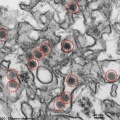File:Zika virus TEM02.jpg: Difference between revisions
mNo edit summary |
mNo edit summary |
||
| Line 1: | Line 1: | ||
==Zika virus== | ==Zika virus== | ||
Transmission electron micrograph (TEM) of virus particles are 40 nm in diameter, with an outer envelope, and an inner dense core. | Transmission electron micrograph (TEM) of virus particles are 40 nm in diameter, with an outer envelope, and an inner dense core. ZIKV is an RNA virus containing 10,794 nucleotides encoding 3,419 amino acids. | ||
Zika virus (ZIKV) is a mosquito-borne ''flavivirus'' related to dengue virus first isolated from a rhesus monkey in Zika forest, Uganda (1947). Transmitted by mosquitoes (''Aedes aegypti'') it was then identified in humans in Nigeria in 1954 and subsequently in South America, Asia and Pacific regions. More recently in Australia from returning travellers. Mosquito bites lead to an initial infection of skin cells. The virus may also be transmitted transplacentally or during delivery. Some limited evidence, from Brazil, for association with microcephaly. | Zika virus (ZIKV) is a mosquito-borne ''flavivirus'' related to dengue virus first isolated from a rhesus monkey in Zika forest, Uganda (1947). Transmitted by mosquitoes (''Aedes aegypti'') it was then identified in humans in Nigeria in 1954 and subsequently in South America, Asia and Pacific regions. More recently in Australia from returning travellers. Mosquito bites lead to an initial infection of skin cells. The virus may also be transmitted transplacentally or during delivery. Some limited evidence, from Brazil, for association with microcephaly. | ||
Revision as of 11:00, 29 January 2016
Zika virus
Transmission electron micrograph (TEM) of virus particles are 40 nm in diameter, with an outer envelope, and an inner dense core. ZIKV is an RNA virus containing 10,794 nucleotides encoding 3,419 amino acids.
Zika virus (ZIKV) is a mosquito-borne flavivirus related to dengue virus first isolated from a rhesus monkey in Zika forest, Uganda (1947). Transmitted by mosquitoes (Aedes aegypti) it was then identified in humans in Nigeria in 1954 and subsequently in South America, Asia and Pacific regions. More recently in Australia from returning travellers. Mosquito bites lead to an initial infection of skin cells. The virus may also be transmitted transplacentally or during delivery. Some limited evidence, from Brazil, for association with microcephaly.
- Zika Links: Image - unlabelled virus EM | Image - labelled virus EM | Abnormal Development - Viral Infection
=Reference
CDC Public Health Image Library (PHIL) ID 20487
Original image adjusted in size and labelling.
Cite this page: Hill, M.A. (2024, May 19) Embryology Zika virus TEM02.jpg. Retrieved from https://embryology.med.unsw.edu.au/embryology/index.php/File:Zika_virus_TEM02.jpg
- © Dr Mark Hill 2024, UNSW Embryology ISBN: 978 0 7334 2609 4 - UNSW CRICOS Provider Code No. 00098G
File history
Click on a date/time to view the file as it appeared at that time.
| Date/Time | Thumbnail | Dimensions | User | Comment | |
|---|---|---|---|---|---|
| current | 10:30, 29 January 2016 |  | 600 × 601 (128 KB) | Z8600021 (talk | contribs) | ==Zika virus== Transmission electron micrograph (TEM) of virus particles are 40 nm in diameter, with an outer envelope, and an inner dense core. Zika virus (ZIKV) is a mosquito-borne ''flavivirus'' related to dengue virus first isolated from a rhes... |
You cannot overwrite this file.
File usage
The following 5 pages use this file: